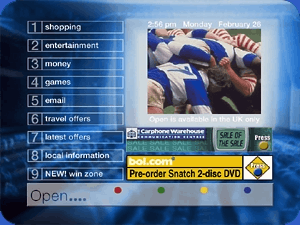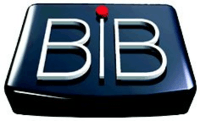Open....
Open.... was an interactive digital television service, based on the satellite transmissions of BSkyB. Launched in October 1999, it was a state-of-the-art, revolutionary service which included home banking, e-commerce, e-mail, video games, and other interactive applications - all meant to cater to the users' specific needs and requirements.[1][2] Launching a few months late in August 1999, it only survived until October 2001 when it was acquired and rebranded by BSkyB, losing GB£116 million.[3] Open.... was awarded a Design Council Millennium Product Award.[4]


The service was operated by Open Interactive Limited, which was a subsidiary of British Interactive Broadcasting. British Interactive Broadcasting was in turn owned by a consortium consisting of companies involving the Hong Kong and Shanghai Banking Corporation, British Telecom, Matsushita and BSkyB. Following disappointing revenues and a shift in marketing at Sky, BSkyB bought out the remaining shares of Open in May 2001 and the service was rebranded as Sky Active.
Service
Open was marketed as the flagship interactive TV service on the then newly launched Sky Digital platform in the UK. Open was originally designed to house all of Sky Digital's interactive functions under the one name and in the one place.
Open had a state of the art fully refurbished head office in Farringdon Street, London where its own content was designed and built. The offices also housed their service control room and the service's proxy servers (for when users' Digiboxes dialed to download and upload data). Transmission took place at the then BT Teleport site in North London.
Services included shopping, email, gaming, banking and information services like film guides and weather. The content was extensive and wide-ranging, however it was a "walled garden", as users could not go on the Internet or on traditional web pages. All content was specifically designed for use on Open and was not available on any other platform.
During its short life, and despite Open processing 65 000 shopping transactions, it lost £116 million.
Access and availability
Access was available to all Sky Digital subscribers and could be accessed at any time by pressing the "Interactive" button on the Sky Digital remote control.
Open.... was marketed as being available 24 hours a day, 365 days a year for the customer's convenience. However, in reality, the service was unavailable for a number of minutes at quieter times (generally around 4 am each morning) when Open....'s proxy server software was being updated. This update meant that Digiboxes could not connect online, and left customers unable to make purchases or download data (such as weather forecasts).
Navigation
Users could navigate through Open.... using either the number keys or via the four coloured buttons typically on their Sky Digital remote control. Other buttons which were used included the "back-up" button to go back a screen, or the directional arrows also on their Sky Digital remote control.
All screens, regardless of who provided the content, displayed the Open.... navigation banner. It was grey and semi-transparent and featured the four coloured buttons. The function of each coloured button varied; however, the red button was always the "go to" menu. It allowed users to bookmark a particular screen, view their browsing history, or "go back" a screen.
Structure
On entering the Open.... platform, users were presented with the Top Level Menu homepage. This consisted of 7 or 8 numbered options (typically shopping, banking, information, email and how to use), and a quarter screen video featuring traditional TV advertising (of the features available through Open....). As users navigated through the various menus, they could eventually enter Open.... service provider portals such as WH Smith shop or Talk21 email. An example can be seen above.
Open.... was divided up into five main zones or areas, these included:
Shopping
Retailers such as Woolworths or The Gadget Shop were able to provide a small shop presence through Open.... featuring their own branding, style and products. Typically, because of the way Open.... worked, users had to connect and allow their Digibox to go online normally at a local rate number to download product information and, in all cases, make a purchase through Open.... Iceland were originally the flagship interactive store but, despite extensive advertising, never actually launched.
Banking
The three main banks to feature a presence on Open.... were HSBC (then Midland Bank), Halifax and The Woolwich; however, HSBC were the only bank to actually provide a true online banking experience. Halifax and The Woolwich only provided information pages on their range of products and services.
Information
Open.... provided various information screens such as news and sports coverage from Sky News and Sky Sports, weather forecasts, showbiz (through the "Hello" portal) as well as cinema listings and travel guides. Open.... also featured a Going Places travel agent outlook, but again, this was just for information; no holidays could be purchased via Open....
Gaming
Gaming was exceptionally popular with younger Open.... users. Games were generally available over the satellite transmission and, as such, did not require the user to go online to download game data (except when submitting high scores).
Original games included Beehive Bedlam, Fathom, Big Top Drop, Sheep Dip, Marvin Mole, King Tutti, Bumble Tumble, and Corporal Cluck. Marvin Mole Level 5 was completed blindfolded by Daniel Shah, in over 1000 moves.
Beehive Bedlam was the only game which was still available through the Sky Games portal until its closure in January 2015. Although viewers didn't actually notice a difference apart from the Sky Games branding; the game had been totally rebuilt from scratch since Open.... first launched.
Beehive Bedlam was relaunched in 2020 in Sky Q.
Personal
Open.... provided (through BT) a Talk 21 email portal. Through the Digiboxes' online connection, users could register, send and receive email through the BT Talk 21 service.
All emails (regardless of encoding) were seen and sent as plain text. Attachments could not be read or attached. When the service was first launched, it was expected to use the @open-talk.co.uk domain; however, as BT were a major shareholder, it was felt better to use the BT Talk 21 email brand.
Another Open.... service was the Open Organiser. It allowed users to create personal profiles and store their credit card details for use throughout the whole Open.... platform. Rather than have to type in your name, address and credit card number in every time you wanted to purchase something through Open...., you could opt to select your profile from the Organiser screen and use those stored details. The Organiser portal required an online connection at all times in order to work.
Criticisms
Open.... faced many critics and criticisms, some of which are listed below:
1. Open was extremely slow compared with the Internet. When users transitioned between zones or service providers, they faced around a 30-second wait for the next application to download.
2. Online connections. To send any data to Open...., users were required to allow their digiboxes to go online normally at a local or national rate phone number.
3. Users could not watch Sky TV and use Open.... at the same time.
4. Being a "walled garden", service providers had to lease a certain amount of capacity on the platform. With this in mind, online shops normally featured an extremely limited selection of products.
5. A number of service providers were heavily advertised such as Iceland and E*Trade. However, these providers never actually launched a service on the platform.
References
- British Interactive Broadcasting (BIB) Promo on YouTube
- "British Sky Broadcasting Group plc Annual Report 1999, page 27" (PDF). British Sky Broadcasting. Retrieved 11 August 2020.
- Bell, Emily (7 May 2001). "Bang! The door slams shut on Open". The Guardian. Retrieved 5 June 2013.
- "Millennium Products" (PDF). Design Council. Archived from the original (PDF) on 19 July 2011. Retrieved 5 June 2013.